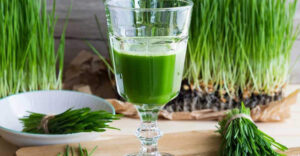 Wheatgrass Juice Containing Antioxidants Has Amazing Benefits For the Body
Wheatgrass Juice Containing Antioxidants Has Amazing Benefits For the Body
Are you aware of the many health benefits of wheatgrass? Wheatgrass is most commonly used in smoothies, like green powders, because of its potent medicinal properties and nutritional value. The underlying concept behind wheatgrass is to add powerful superfoods to your diet, so you load up on more beneficial phytonutrients to aid in the healing of your body. Let’s take a look at a few ways that wheatgrass can benefit your health.
One way that wheatgrass can benefit you is through its ability to cleanse your system of harmful toxins. When you consume wheatgrass, your body will release digestive enzymes and sulfate acids into your bloodstream, causing it to be more alkaline and free from toxins. Phytochemicals present in wheatgrass juice are said to regulate your cholesterol level and regulate insulin levels to prevent diabetes. Regular consumption can also boost your immune system and improve your endocrine system. It’s also been shown to lower your blood pressure. Since it also contains antioxidants, this means that you’re protecting your whole blood system.
A second way that wheatgrass may help you is by preventing cancer or minimizing the risk of cancer. Wheatgrass contains phytoestrogens, which have been linked to a lower risk of certain cancers such as colon, breast, and prostate cancer. It has also been shown to prevent colon cancer, leukemia and lymphoma, and even ovarian cancer. Phytoestrogens appear to inhibit the growth and spread of tumors and may prevent the formation of new blood clots in the arteries.
Wheatgrass powder can be purchased in supplement form or can be consumed directly. You can either make your own wheatgrass shakes using the fresh leaves and stems, or purchase the powdered form of the grass at a health food store. The powdered form does not contain as much chlorophyll though, so it is typically recommended for internal consumption. However, the powdered form does contain a decent amount of chlorophyll-rich nutrients.
Many people who follow a gluten-free diet wonder what the health benefits of wheatgrass are. Many mainstream diets are heavy in wheat and other grains, which are bad for the digestive system because they contain gluten. There are actually a lot of health benefits of wheatgrass on the digestive tract. For one thing, it contains soluble fiber, which acts like glue by attracting toxins and other waste materials to the intestinal tract where they can be dissolved. Also, soluble fiber can slow down the emptying of the bowels, which is something else that you want to avoid when following a gluten-free diet. Flaxseeds are also high in fiber and have similar effects on the intestines.
Constipation is a common problem for those with celiac disease or those who have undergone gastrectomy for cancer treatment. Although there are no known health benefits of wheatgrass in helping to improve digestion, it may help to relieve constipation by infusing more oxygen into the blood. Wheatgrass powder comes in both a tablet and a liquid concentrate that can be taken in capsule form. It can also be added to a glass of water for instant relief from constipation.
One of the more unusual but well-known health benefits of wheatgrass juice contains almost twice the minerals and trace elements needed for good nutrition. Some people consume a teaspoonful of this juice daily, which would be enough to add a few extra minerals and nutrients to their diet. It is important to take any vitamins and minerals in their recommended dosages to get the full benefit.
Any health benefits of wheatgrass should be treated with care and only consumed as directed. There are no known side effects of ingesting this vegetable, although people who are allergic to wheat might not want to consume it. Wheat can be used to make a great nutritional supplement for one’s pet, especially if one already has a pet with some type of chronic health condition. People with a wheat allergy should consult their veterinarian before trying this product. One should never administer wheat to a child who is under the age of 12 or who has a history of allergies to animals.